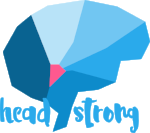Welcome to Headstrong: a place to share my 20-year-old life with post-concussion syndrome (PCS). Here you'll find my stories, life hacks, and answers to (most) of your burning questions.

Welcome to Headstrong: a place to share my 20-year-old life with post-concussion syndrome (PCS). Here you'll find my stories, life hacks, and answers to (most) of your burning questions.

Head injuries have been a hot button topic lately and have been making headlines. This is a look behind the headlines at the real science and the real people. Finding reliable information can be a challenge, so I wanted to bring it all to Headstrong with what you want to know in language that you can understand.
This spring, I had the opportunity to work with Dr. Bob Stern at his lab at Boston University School of Medicine studying chronic traumatic encephalopathy (CTE). Dr. Stern is a renown CTE researcher, prolific publisher, and considered a thought leader in his field. All of the information here on Headstrong is consitant with leading reserach and literature. These will give insight into those affected, the pathology, the symptoms, and the treatments.
Similar information about concussion and PCS is coming soon!

A concussion is a type of traumatic brain injury (TBI) generally resulting in a myriad of symptoms lasting a few weeks. Concussions are relatively common and usually result in a full recovery, but thay are a serious injury and should be handled as such. Click below to learn about the science behind concussions, signs and symptoms, preventive measures, personal stories, and what to do if you think you have a concussion.

Post-concussion syndrome (PCS) is a "blanket termed" disorder resulting in concussion symptoms lasting for more than 3 months. PCS symptoms can last for months or years. Click below to learn more about the science of PCS, signs and symptoms, preventative measures, treatments, personal stories and tips.

Chronic Traumatic Encephalopathy (CTE) is a neurodegenerative disease that has been linked to repetitive head trauma often from long-term participation in contact sports or military service. Click below to learn more about the science of CTE, signs and symptoms, preventative measures, and research.